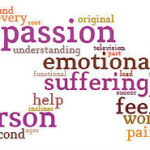Developing love and compassion and reducing anger and spite is a universal activity which requires no faith in any religion whatsoever.– Dalai Lama
What does that mean?
As the Dalai Lama is a religious leader, I believe he is qualifying his statement to let everyone know that anyone can participate. The quote talks about his core topics, love and compassion, of which he believes the world needs more. He also addresses anger and spite, the antagonists to love and compassion. He implies that he believes the world needs less of anger and spite.
But what does that mean? It means that everyone, regardless of religious affiliation, can work on these aspects of their life. There is also a strong suggestion that all of us have room for improvement in those areas. I am inclined to agree, on all counts.
Why is love important?
This is important because it are the foundation of all human happiness. Don’t believe me? Do you really LOVE chocolate (or some other item) the same as you feel love for your closest friend or family member?
Most of us use the work LOVE far too casually. Do you really feel love when you say “I love that TV show”? How about “I love those shoes!”? Or “When did you get the new car? I love it!”? The English language doesn’t have many choices for this spectrum of feelings, and popular culture has broadened the meaning of love almost beyond recognition.
To give you an idea of how varied the term has become, at merriam-webster.com, love has 9 main definitions, and many sub definitions, totaling 17 in all. What I use is closest to definition 4a: “unselfish loyal and benevolent concern for the good of another” as the primary definition for purposes of this post. I also apply it to ideas and ideals in addition to individuals or groups of people.
How do you use the word love and what other words might be more appropriate in these situations? Gets kind of complex, doesn’t it? Especially when the word is so charged with emotion that not saying it can get you in trouble (right, guys?). If you are going to start using a different word for some of these, be sure to clue everyone in, or it could be a bumpy ride!
Where can I apply this in my life?
Using the definition we just discussed, what do you truly love? Let’s write a few of these down. Hopefully a person or two made the list, and hopefully an ideal or idea made the list. As examples of love in relation to an ideal or idea, do you love freedom? Do you love liberty? How about peace and harmony? And justice, does that make the list? Do you have an unselfish loyal and benevolent concern for justice being applied?
With this list as a starting point, how can we develop love? Well, the definition gives us a road-map: “unselfish and benevolent concern” – that looks like a good place to start. How can one practice being unselfish and benevolent?
Another word for unselfish would be generous, and benevolent is suggestive of goodwill. Thus goodwill and generous are very similar words, so let’s look at how to be more generous. Donating time or money to charity certainly is generous. If you’ve ever done either, I’m sure you felt better about yourself and about the hopes for the future of humanity.
Hopefully that feeling was strong enough to incite you to do it again, and again. If not, there’s no time like the present. What cause stirs a passion in you? Helping homeless, helping veterans, helping the abused, helping the hungry, helping the sick or helping animals might be some suggestions.
In what other ways can one be generous or show goodwill? We can be generous with praise, saying “please” and “thank you” more often, even to strangers (perhaps that should be especially to strangers). We can show goodwill by letting someone else in first, whether at the checkout counter or at a traffic signal, don’t push to get there first. How much time will it cost you? They might be in a hurry too, you know!
Back to the list. What can you do to deepen your commitment to each of the things you love? Do you want to add an item or two? This is very personal, so you are going to have to determine what is most appropriate for you and your situation. I would add a detail or two to each item for how I would deepen the commitment to unselfish and benevolent concern.
I would then choose one to start with and make a more complete roadmap, to brainstorm all the ideas I could to make this a greater, more pervasive love. And then choose the easiest of the ideas, and do it right this moment. Start the ball rolling and then follow-up.
We have talked a lot about love, but I’d like to take a little time for compassion (sympathy for those in distress or a desire to alleviate their distress). How can we show compassion? In a lot of cases, you can use items from the list of generous activities apply here. Also, consider how else people can be in distress, and how you can alleviate it.
Is someone stressed at work, and can you put them at ease, even a little? How about someone who is having trouble with a teenager, can you sit and just listen for the time it takes to finish a cup of coffee? Do you know someone in the neighborhood who is struggling with their yard work, shaggy bushes, weeds and the like?
Can you spend an afternoon helping out? Whether they are old, infirm, lacking the proper tools or just short on time, can you help alleviate their distress? Perhaps you have a teenager. You can ask them to help out and thereby help two people understand compassion.
Lots of ideas, lots of possibilities. Take some time and put together a list of at least three things that can help you reinforce your compassionate tendencies. You’ll only get out of it what you put into it, so please give it a try.
To round out the saying, how do we reduce anger and spite? Anger usually comes from someone not doing what you want or expect, or a situation not turning out the way you desired. For me, I try to remind myself that I can only control myself, and that other people behave based on their rules and values. I cannot force them to do something, but I can try to explain it to them so that they understand what it means to me and then hope they do the right thing. Ahem. I meant that they do what I would like for them to do.
Compassion works in reducing anger quite well, in my experience. Did that person cut you off because they were deliberately trying to be a jerk, or did they lose track of where their exit was and have to move over quickly to get there? That’s just a quick example. As you try to observe this more closely, you will start getting better at spotting times when you used to get angry, but now you just let it go. I won’t try to fool you, it will take some effort, but I will tell you it’s worth it.
Take a moment and list about a dozen things that stupid people do that really gets you angry. Get the whole dozen written down. For each thing someone does, put yourself in their shoes and try to understand why they might do that. Yeah, they’re breaking the rules you live by, if they weren’t they wouldn’t be on your list.
So you can start with the assumption that they either are not very observant (didn’t notice they were breaking rules), or that they have different rules. Write down a couple reasons why someone could do something that angers you, but feel justified in doing it (or not feel bad about doing it). Remember, we all have our rules, and some exceptions. That includes the other guy.
Spite is anger in action, and if we can help reduce the problem of anger, spite should take care of itself. I would try, if I were to find myself in a spiteful mood, to ask if the action I was contemplating would improve the situation for anyone. Usually, when we are being spiteful, the answer is no. I use that as a clue that the action I was contemplating was not a correct action.
Try to think of the last three or four times you did something out of spite. Now look at them and see if you feel proud of those actions or their outcomes. Take a moment to feel regret or remorse for the actions, and associate being spiteful with being sad. It’s another way to build associations to help you avoid the behavior.
I mentioned at the top that anger and spite are the antagonists to love and compassion. I would also like to state that the reverse is true – love and compassion are the keys to reducing anger and spite.
From: Twitter, @DalaiLama
confirmed at : it’s his own feed…
Photo by mmadden








Pingback: Even people opposed to religion need calm minds and compassion to make their work more effective. | philosiblog